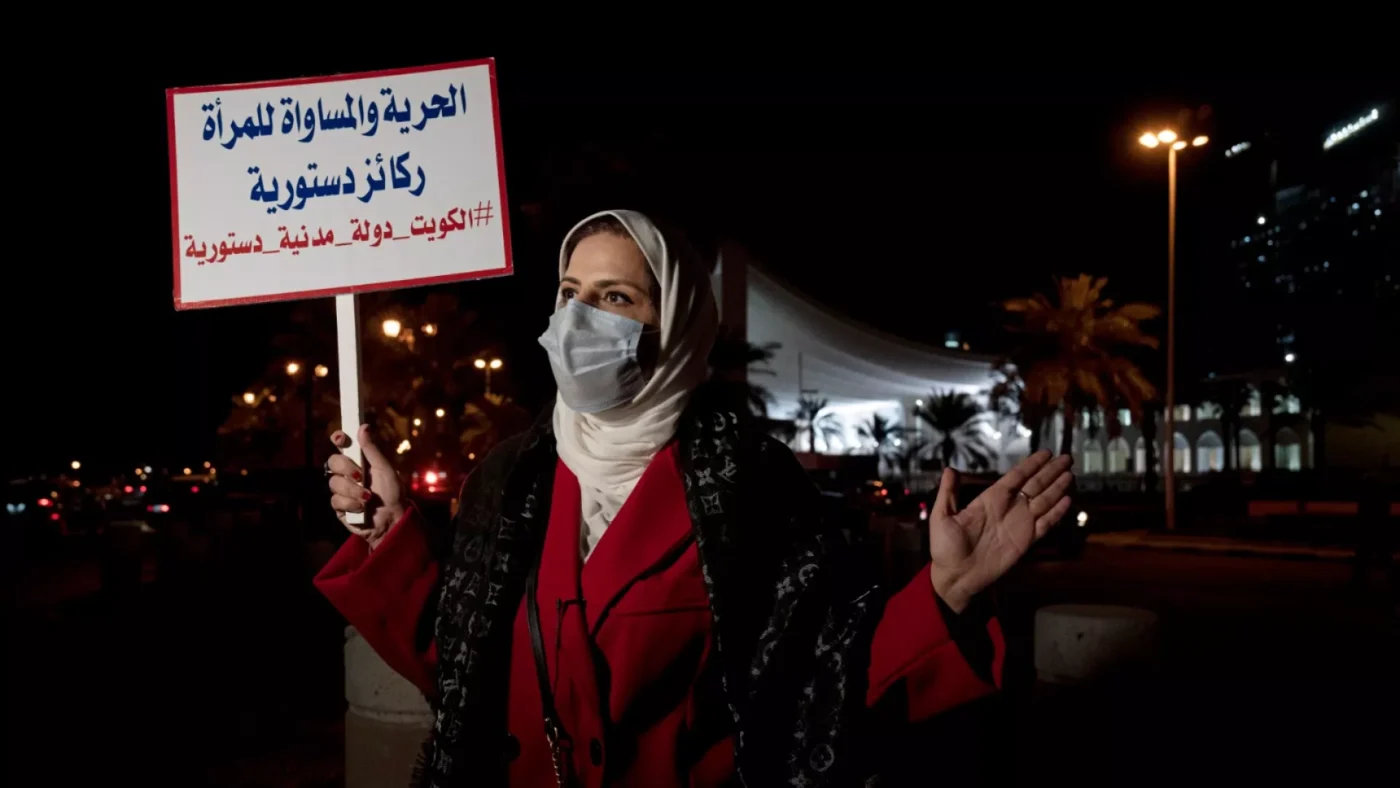The women’s rights situation in Kuwait is similar to that of other Gulf Cooperation Council (GCC) countries, where the male guardianship system limits women’s autonomy to make decisions about their lives.
Discrimination against women in Kuwait is well reflected in the country’s two personal status laws (PSLs) codified in 1984 and 2019. Laws that regulate all the issues concerning family, such as marriage, divorce, child custody, or inheritance, and which inevitably affect women more than men. Particularly, Musawah, a global movement fighting for equality and justice in Muslim Family Law, considers that Kuwaiti’s PSL enforces de jure and de facto discrimination against women in regard to equality in marriage, women’s consent and capacity to enter into marriage, child custody and early marriage, polygamy and divorce rights. In matters of marriage, for example, Kuwaiti women are required to have the permission of a male guardian to marry, and they can see their spousal maintenance being denied if they refuse to live with their husbands with no justification. Concerning divorce, only husbands can separate from their wives without any restriction, while women must resort to a court to grant them divorce on very limited grounds. Discriminatory biases are also applied in child custody provisions, by which Kuwaiti women married to non-Kuwaitis cannot pass Kuwaiti citizenship to their children or spouses on an equal basis with Kuwaiti men.
More recently, in February 2024, Kuwaiti women protested the new restrictions imposed on them in the country. In this vein, according to Human Rights Watch, although authorities allowed women to join Kuwait’s army, they later clarified that they could only do so under certain conditions: that they obtain their guardian’s or husband’s permission, and work in medical and support positions. In addition, they cannot carry weapons, and they can only be enrolled in the military when necessary to fill vacancies.
However, without downplaying the importance of the issues mentioned, no aspect better reflects the long way Kuwait has yet to go in advancing women’s rights than Article 153 of the Penal Code, which enshrines impunity for men who inflict violence upon women. More precisely, it asserts that any man who surprises his mother, sister, daughter, or wife in an unsavory sexual act with a man and kills her, him, or both, will be treated as if committing a misdemeanor punishable by a maximum of 3 years in prison and/or a fine of 3,000 rupees. By justifying the murder of a male’s female relative on the basis of honour, the law stands contrary to the goal of criminalizing and eliminating violence against women. Moreover, the law also explicitly discriminates between women and men in terms of the penalty that is imposed on the culprit of the murder for adultery, granting men but not women the possibility to be charged with a misdemeanor instead of a felony.
Standing up against the structural and physical violence exerted against women is the Abolish 153 Campaign, a national campaign led by a group of activists in Kuwait that are pushing for the end of all forms of violence against women in the Arabian Gulf region. Starting with the article that grants a male murderer the power to be an adversary, judge, and perpetrator of the sentence, all at the same time, giving no option to the female to defend herself. In what could be considered the first survey conducted on society’s attitudes toward such legislation in Kuwait, the campaign found out already in 2016 that the vast majority of Kuwaitis do not know that there is a law that permits honour crimes in the country, with 63% of respondents rejecting the existence of this law. In January 2024, after consultation with religious authorities, the Kuwaiti parliament missed a real opportunity to change this unjustifiable reality when it dropped a legal amendment that would have repealed Article 153 in line with the sentiments of a large part of the population.
Article 153 of the Penal Code lays incredible obstacles to women’s attainment of their legitimate rights and does so in disregard of the Kuwaiti Constitution and the country’s International Human Rights obligations. The Kuwaiti Constitution calls for promoting the values of equality between men and women in law and in public duties as well as ensuring a fair trial. Article 153 also violates the Convention on the Elimination of All Forms of Discrimination against Women (CEDAW) and the International Covenant on Civil and Political Rights (ICCPR), of which Kuwait is a state party, specifically: Article 2 (CEDAW) on the pursuit, by all appropriate means, of the elimination of discrimination against women; Article 15 (CEDAW) on women equality with men before the law; Article 3 (ICCPR) on equal right of men and women to the enjoyment of all civil and political rights; and Article 6 (ICCPR) on the right to life.
Women have the right to live in a safe environment, free from violence. We demand that Kuwait ends all forms of discrimination against women, with special attention to the shameful Article 153.





